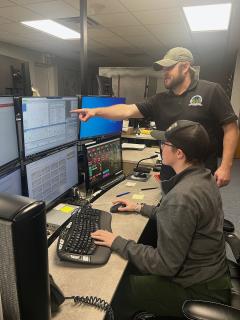Weber Basin Job Corps welcomes second cohort of Advanced Emergency Dispatch students
UTAH—The Weber Basin Job Corps Civilian Conservation Center welcomed a second student cohort into its Advanced Emergency Dispatch training program in January. Dispatchers play a critical role in wildland firefighting by collecting and disseminating information needed to dispatch appropriate resources, from personnel to supplies or equipment, to fires and national emergencies. Once the students complete their training, they will enter a pool of qualified or trainee Expanded Dispatch Recorder dispatchers and provide much-needed support during the fire season.
In its inaugural year, Weber Basin is not basking in its success. There are barriers to overcome as the program matures. Yet training specialist Kyle Yurkovich feels very supported. “If I reach out for a favor, I’ve always had a positive response—whether it’s on campus or with regions, ranger districts or dispatch centers. It’s not that we can’t move forward. We’re making hay. We moved our students through the program last year—they found jobs in fire or natural resources, they made good money and no one got hurt.”
Across the nation, dispatch centers are struggling to fill forestry technician GS-0462 initial attack dispatcher positions because of a lack of qualified applicants. Applicants are required to have 90 days of firefighting experience, which significantly impacts recruitment for existing and future dispatcher vacancies. The Weber Basin and Harpers Ferry programs are working to provide qualified and engaged dispatchers for coordination centers across the country.
The success of the three students in Weber Basin’s inaugural class has laid the groundwork for future students. Damian Marquis King, Takoda Williams and Bertha “Lili” Hernandez Requeno have all been placed in dispatch or administration positions.
The students spend four months in intensive foundational courses learning about weather, geography, mapping, civics, government, incident command system, National Wildfire Coordinating Group wildland fire management and computer-aided dispatch systems.
“We bring representatives into the classroom from every one of our federal agencies that deal with fire and provide the students an introduction to all the parties involved,” said Yurkovich. “We also include the state of Utah, nonprofit organizations and the Utah State smoke coordinator to discuss their roles.”
There’s also instruction on the specifics of wildland fire, communications, wildland firefighting lessons learned reviews and natural resources management. Academic instruction is topped off with basic medical training and fire school, among other courses.
Students continue training at the Northern Utah Interagency Training Center, where they receive foundational dispatch training and attend several more weeks of class on initial attack dispatch.
Once fully staffed, the Weber Basin program will include two training specialists and an initial attack dispatcher. A central philosophy of program instruction is to establish consistency in course delivery. The goal is not only to train students in emergency dispatch, but also help them understand that the Forest Service is more than just fire and fire is more than just the Forest Service. By the end of their training, students understand if they enjoy natural resources management and land stewardship, they have numerous career options that can take them anywhere in the U.S.
Helping students with career planning is a high priority. “We lay out all the pieces on the chess board, building a foundation of knowledge of the industry and cap it off with how it relates to emergency dispatch,” said Yurkovich.
Once instructors determine a student is ready for a fire dispatch assignment, the student enters a pool of qualified or trainee EDRC dispatchers and are available to take a paid assignment to refine their skills, network and ultimately apply for jobs.
The Weber Basin and Harpers Ferry Job Corps advanced dispatch programs demonstrate what can be accomplished when energetic, determined Forest Service staff identify an agency problem and look for solutions.


